Ties between India and China are frosty. Amid this, President Xi Jinping has decided to skip the all-important G20 Leadership Summit in New Delhi on 9 and 10 September. Premier Li Qiang will represent the Communist nation instead. This is the first G20 Summit that the Chinese president will miss. It has left America ‘disappointed’ but India says his absence is not unusual. Xi’s decision to not participate in the conclave came after New Delhi protested against a 2023 ‘standard map’ of China laying claim to Arunachal Pradesh and Aksai Chin, which was occupied in the 1962 war. But is the tension with India the reason not to attend the G20 Summit ? Or is there something more to it? Reports suggest that the unexpected decision could be linked to China’s internal politics. Don’t miss: Our complete coverage of the G20 Summit Was Xi Jinping pulled up by party elders? A report in Nikkei Asia points to a meeting held at the Beidaihe seaside resort in China’s Hebei province. It is an annual gathering of incumbent and retired leaders of the Chinese Communist Party. Like everything linked to politics in the country, this closed-door conclave is always a secret. But this year some details have emerged. It was not business as usual. It felt “significantly different” from the earlier 10 meetings that have taken place since Xi took charge as general secretary of the party in 2012, reports Nikkei Asia. At this year’s gathering, the Chinese president reportedly got a dressing down from retired party elders. He was reprimanded in a way they had not until now, the report says. This came despite the absence of prominent party leaders like former president Jiang Zemin who passed away last November, and Xi’s predecessor Hu Jintao , who has kept a low profile after he was unceremoniously removed from the Great Hall of the People at the party’s national congress last October. Leading the veterans was Zeng Qinghong, former vice president and a close aide to Jiang. The senior party members reportedly met ahead of the Beidaihe gathering to summarise their opinions before conveying them to the current leaders, according to Nikkei Asia.
The turmoil in China has left party elders concerned. The country is facing an
economic slowdown
, which means it is no longer on the way to becoming the world’s largest economy. Its exports and imports both slumped in August as twin pressures of sagging overseas demand and weak consumer spend hit businesses. The real estate crisis continues and youth unemployment is surging. The military is also mired in controversy. Two top Rocket Force generals were fired. And not all is well within the political circles. Chinese foreign minister
Qin Gang
has been ousted from the post for unknown reasons. The country has reasons to worry and the Communist Party seniors conveyed this to the current leadership, including Xi, in a face-to-face meeting in Beidaihe. The gist of the message was that if the political, economic and social turmoil continues without any effective countermeasures being taken, the party could lose public support, posing a threat to its rule, reports Nikkei Asia. We cannot have more turmoil, the elders pointed out. [caption id=“attachment_13091562” align=“alignnone” width=“640”]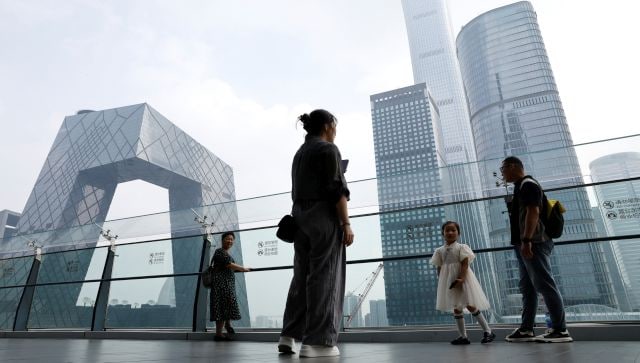 China is facing an economic slowdown and Xi Jinping was reportedly reprimanded by party elders over the economic and social turmoil in the country. Reuters[/caption]
Also read: G20 Summit: What Xi and Putin’s absence means for India
How did Xi Jinping react? The Chinese president did not expect the criticism. He held a meeting with his close aides and reportedly pointed fingers at three predecessors, Deng Xiaoping, Jiang, and Hu. Xi complained that the problems that plague China were because of the earlier leadership and told his aides to resolve them. “I’ve spent the last decade tackling them but they remain unresolved. Am I to blame,” he asked, according to the report. The Chinese president’s anger left Premier Li Qiang shaken. No 2 in the party hierarchy, he is in charge of the economy. The Nikkei Asia report says that Xi’s decision to skip the G20 meeting is an attempt to avoid losing face. The inner circle decided to send Li to address these concerns since he is responsible for China’s economy. The Chinese president probably has stayed away over concerns that he would be questioned about the country’s poor economic performance. [caption id=“attachment_13091602” align=“alignnone” width=“640”]
China is facing an economic slowdown and Xi Jinping was reportedly reprimanded by party elders over the economic and social turmoil in the country. Reuters[/caption]
Also read: G20 Summit: What Xi and Putin’s absence means for India
How did Xi Jinping react? The Chinese president did not expect the criticism. He held a meeting with his close aides and reportedly pointed fingers at three predecessors, Deng Xiaoping, Jiang, and Hu. Xi complained that the problems that plague China were because of the earlier leadership and told his aides to resolve them. “I’ve spent the last decade tackling them but they remain unresolved. Am I to blame,” he asked, according to the report. The Chinese president’s anger left Premier Li Qiang shaken. No 2 in the party hierarchy, he is in charge of the economy. The Nikkei Asia report says that Xi’s decision to skip the G20 meeting is an attempt to avoid losing face. The inner circle decided to send Li to address these concerns since he is responsible for China’s economy. The Chinese president probably has stayed away over concerns that he would be questioned about the country’s poor economic performance. [caption id=“attachment_13091602” align=“alignnone” width=“640”]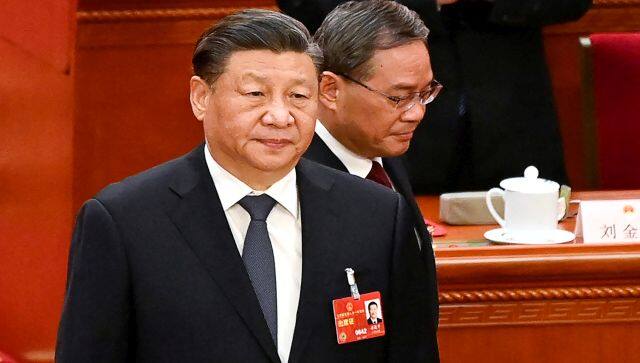 China’s president Xi Jinping and premier Li Qiang at the Great Hall of the People in Beijing. The latter is in charge of the economy and will now represent China at the G20 Summit. File photo/Reuters[/caption] Another major factor behind Xi’s G20 absence is that no breakthrough in stalled relations with the US appears on the horizon, the report says. Ties between the US and China have remained tense despite several diplomatic visits from Washington to revive dialogue. The two countries are at loggerheads over the Russia-Ukraine war, Taiwan and the South China Sea, human rights in Xijiang and economic restrictions. This is the second meeting Xi has decided not to attend. In August, he did not show up at a business forum held on the sidelines of the BRICS Summit in South Africa. His speech was read out by Chinese commerce minister Wang Wentao. Xi’s absence comes at a time when China’s relationship with India and the US is deteriorating. Also read: Why does China keep claiming Arunachal Pradesh and Aksai Chin?
How has India reacted to Xi’s absence? Xi’s absence at G20 will not affect negotiations to produce a consensus communique at the meeting, External Affairs Minister
S Jaishankar
said. The leaders’ summit is held in the context of a “very turbulent” global environment and expectations from the G20 to find solutions to some of the world’s pressing problems are “very high”, he told the ANI news agency. The minister said leaders had skipped summits in the past and Xi doing so was not unusual and had nothing to do with India. [caption id=“attachment_13091622” align=“alignnone” width=“640”]
China’s president Xi Jinping and premier Li Qiang at the Great Hall of the People in Beijing. The latter is in charge of the economy and will now represent China at the G20 Summit. File photo/Reuters[/caption] Another major factor behind Xi’s G20 absence is that no breakthrough in stalled relations with the US appears on the horizon, the report says. Ties between the US and China have remained tense despite several diplomatic visits from Washington to revive dialogue. The two countries are at loggerheads over the Russia-Ukraine war, Taiwan and the South China Sea, human rights in Xijiang and economic restrictions. This is the second meeting Xi has decided not to attend. In August, he did not show up at a business forum held on the sidelines of the BRICS Summit in South Africa. His speech was read out by Chinese commerce minister Wang Wentao. Xi’s absence comes at a time when China’s relationship with India and the US is deteriorating. Also read: Why does China keep claiming Arunachal Pradesh and Aksai Chin?
How has India reacted to Xi’s absence? Xi’s absence at G20 will not affect negotiations to produce a consensus communique at the meeting, External Affairs Minister
S Jaishankar
said. The leaders’ summit is held in the context of a “very turbulent” global environment and expectations from the G20 to find solutions to some of the world’s pressing problems are “very high”, he told the ANI news agency. The minister said leaders had skipped summits in the past and Xi doing so was not unusual and had nothing to do with India. [caption id=“attachment_13091622” align=“alignnone” width=“640”]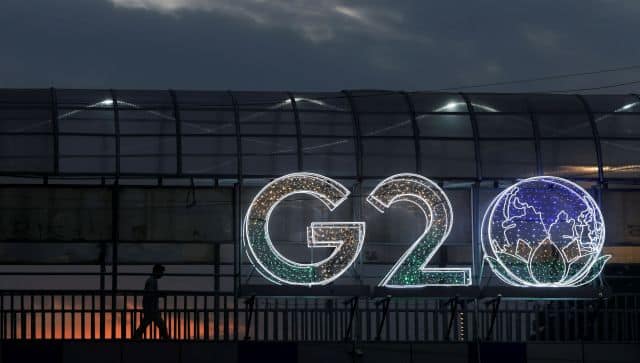 A man walks past an installation on a skywalk ahead of the G20 Summit in New Delhi. India has said that the Chinese president’s absence is not unusual. Reuters[/caption] What is the US saying? On Xi skipping G20,
Joe Biden
said, “I am disappointed… but I am going to get to see him.” However, the US president did not say when the meeting would take place. It is for China to decide what role it plays at the G20 Summit in New Delhi, US national security advisor Jake Sullivan said, asserting that if Beijing wants to come in and be a “spoiler”, that option is available to it. He was responding to a question at a White House news conference on Tuesday on the impact of India-China border tensions on the gathering. “As far as the question of tensions between India and China affecting the (G20) summit - really that’s up to China. If China wants to come in and play the role of spoiler, of course, that option is available to them,” he said. “What I think the Chair, India, will encourage them to do what we, the United States and every other member, virtually every other member of the G20 will do, is encourage them to come in, in a constructive way on climate, on multilateral development, bank reform, on debt relief, on technology and set aside the geopolitical questions and really focus on problem-solving and delivering for the developing countries,” Sullivan said. [caption id=“attachment_13091632” align=“alignnone” width=“640”]
A man walks past an installation on a skywalk ahead of the G20 Summit in New Delhi. India has said that the Chinese president’s absence is not unusual. Reuters[/caption] What is the US saying? On Xi skipping G20,
Joe Biden
said, “I am disappointed… but I am going to get to see him.” However, the US president did not say when the meeting would take place. It is for China to decide what role it plays at the G20 Summit in New Delhi, US national security advisor Jake Sullivan said, asserting that if Beijing wants to come in and be a “spoiler”, that option is available to it. He was responding to a question at a White House news conference on Tuesday on the impact of India-China border tensions on the gathering. “As far as the question of tensions between India and China affecting the (G20) summit - really that’s up to China. If China wants to come in and play the role of spoiler, of course, that option is available to them,” he said. “What I think the Chair, India, will encourage them to do what we, the United States and every other member, virtually every other member of the G20 will do, is encourage them to come in, in a constructive way on climate, on multilateral development, bank reform, on debt relief, on technology and set aside the geopolitical questions and really focus on problem-solving and delivering for the developing countries,” Sullivan said. [caption id=“attachment_13091632” align=“alignnone” width=“640”]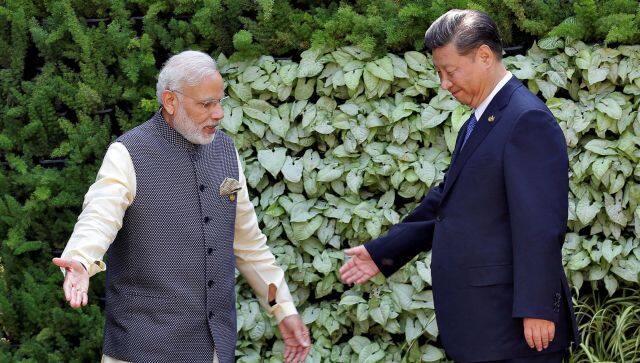 Prime Minister Narendra Modi and Chinese president Xi Jinping during BRICS Summit in 2016. File photo/Reuters[/caption] How has China responded? The Chinese foreign ministry on Tuesday said that it was ready to work with all the parties for the global event’s success in New Delhi this week. When asked if the decision to send the premier instead of the president reflected tensions between the two countries, China’s foreign ministry spokesperson Mao Ning said that China-India relations have been “stable on the whole”. Without mentioning the border dispute, she further said, the two sides have “maintained dialogue and communication at various levels”. With inputs from agencies
Prime Minister Narendra Modi and Chinese president Xi Jinping during BRICS Summit in 2016. File photo/Reuters[/caption] How has China responded? The Chinese foreign ministry on Tuesday said that it was ready to work with all the parties for the global event’s success in New Delhi this week. When asked if the decision to send the premier instead of the president reflected tensions between the two countries, China’s foreign ministry spokesperson Mao Ning said that China-India relations have been “stable on the whole”. Without mentioning the border dispute, she further said, the two sides have “maintained dialogue and communication at various levels”. With inputs from agencies
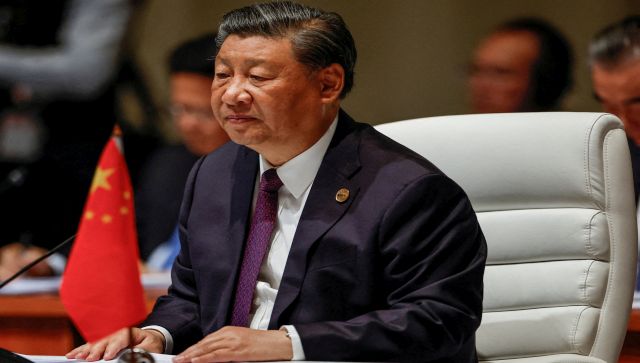)